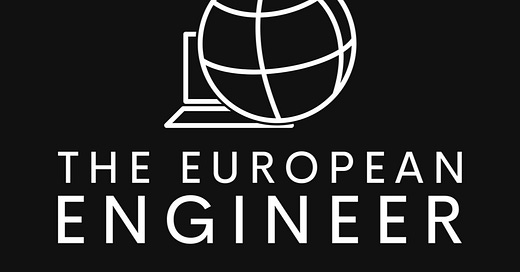EDIT: the paid articles of The European Engineer newsletter have moved to Beehiiv. They’ll now be available to the subscribers of EuroTopTechJobs.com, as complementary learning material to facilitate landing the top jobs from the job board.
This is the first article of a series on building a CV aimed at landing top tech roles.
As a resource, it is destined for the paid subscribers of The European Engineer newsletter. Who, in addition to this kind of stuff, get access to EuroTopTechJobs.com and other private guides like this one or this LinkedIn one.
9 euros a month, or 75 euros a year.
Let’s start!
Intro
A well-crafted CV is mandatory if you want to land a top job in tech.
In fact, the only two things you need to land a top job are:
Land an interview for a top job
Pass the interview
A great CV helps you achieve 1.
The other things that help you land an interview are:
Referrals and connections with the company and/or the hiring team
Solid experience and skillset
A great profile-job match (you being a great fit for the role)
A top-tier LinkedIn profile
We’ll have time to talk about all of this in the coming months.
So, rest assured: if your goal is to land top jobs in Europe, here you’ll find all the support you need.
I wouldn’t have started this newsletter and all the things I do if there were good enough resources out there.
In fact (sorry, only 20 more seconds before we get to the CV stuff xD), here’s why I started it:
Felt sorry and angry for like 5 years for how much harder I had to work to get a good tech career in Europe compared to someone in the US.
Decided to turn a negative into a positive by creating something around all the extra work I had to do to figure out the ins and outs of Europe’s tech market.
Ok, CV time.
Your CV should be a one-pager
There are very few exceptions to this.
For big tech companies: always a one-pager.
For contract roles: can be longer but tbh I’d still make it a one-pager. Same thing for high-paying remote roles.
Here's a framework to build a powerful CV that fits in one page:
Choose a minimalistic template in Latex/Gdocs.
Have an ideal role in mind that you're targeting with your CV.
If you have more than an ideal role in mind, make one CV for each.
Gather the best data from your history that shows why you're a great fit.
Prioritise and give more space in the CV to the most recent and more "fitting the ideal role" work experiences you have.
Throughout the CV: show, don't tell.
Meaning, show you're good at something by displaying real world scenarios where you've delivered impact thanks to such skills.
Be as specific as possible, using the "Accomplished [X] as measured by [Y], by doing [Z]" framework:
❌ Built a new feature in a web app in a team of 5 developers.
✅ Enabled a 10x+ latency reduction in DB health monitoring by refactoring a Python script to retrieve data from object storage instead of querying various APIs.
Maintenance:
Always keep a "brag doc" where you note down the good things you're achieving at your current job.
Regularly update your CV with the achievements from your brag doc.
Remove the fluff:
❌ "proactive, independent developer with great communication and leadership skills"
❌ "speak Mandarin, Spanish and French"
❌ photo
Technologies, frameworks and programming languages:
❌ Have a big CV section where you include all the tech you ever used
✅ Keep such a section small, listing only your top skills. Mention the technologies you used throughout your CV in your work experience bullet points.



